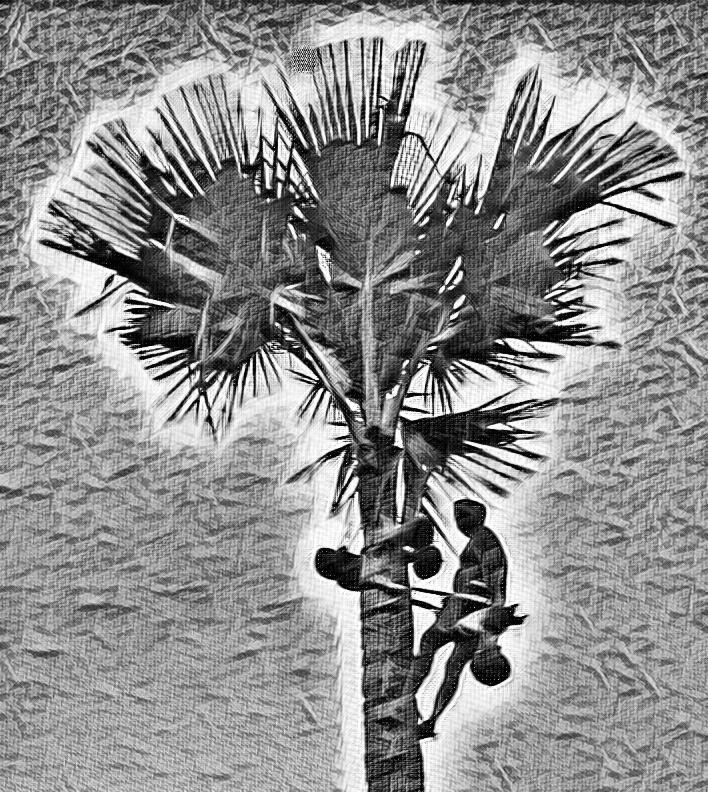It is an alcoholic beverage created from the sap of various species of palm trees such as the Palmyra (Thati Kallu) and Date Palms (Eetha Kallu). Traditionally it was the primary source to ‘drink’. In general, it is called ‘Kallu’ in Telugu, which is white in colour.
Drinking is considered a wrong thing to do, in some cultures and religious faiths. For someone like me coming from Telangana State in India, it is a cultural practice, especially in the rural areas.
The Palmyra is the official tree of Tamil Nadu State in India. Highly respected in Tamil culture, it is called ‘Karpaha Veruksham’ ('celestial tree’) because all its parts have a use.
There are types of Toddy extracted from trees. Its quality varies according to the season, soil, species variation and local climate. Especially the Toddy tapped during the summer from the male Palmyra trees is called ‘Pothu Thati Kallu.’ The trees importance is highly appreciated by the drinkers as its yield is high in the summers and very much needed. A cool way to beat the miserable heat of the summers.
Gouds or Goundla, is a particular community engaged in Toddy tapping. Usually, they wear a ‘Budda Gochi’ or a small lion cloth for convenience to climb. They tie a thick rope around their waist and the tree that they climb. This rope has a layer of rubber too, for increasing the friction so that it does not slip. By pushing the body away and lifting both the feet to a higher hold they climb and by doing the reverse, they climb down. A small ring of rope connects the two legs for the extra grip on the tree trunk. Climbing Toddy tree is no less than an athletic feat!
The Toddy is always tapped from a place just below the crown of the tree. They climb the tree carrying a sharp blade made of iron and clay pots hanging behind for collecting the Toddy. They make a cut on the trunk and the sap oozes out. The dripping sap is directed into the empty pots, with small guides. The pots are tied to the tree. If the plants are in a farmer’s field, the person who harvests the Toddy on a regular basis, in return shares some part of Toddy. Rest they would sell to others in the village. In the past Toddy was never sold for money, the farmers shared part of their produce after harvesting for the Toddy served to them throughout the year, as part of a traditional jajmani system. Indian economic system in the past, in which lower castes performed various functions for the upper castes and received grains in return in the past. Jajmani system is the bonding between the consumer and the service provider which was lifelong and inter-generational with both parties respecting the rights and obligations.
They had been collecting Toddy from some of the trees for generations. They know the exact taste of Toddy from each tree.
With demand and supply gaps, due to increased population and vanishing palm trees, the Toddy served today in villages is just artificial and a chemical based chloroform intoxicant. It is also called ‘Mandhu Kallu’. Many people dependent on the traditional Toddy tapping have lost their livelihoods. The habituated people when they stop consuming such Toddy they go insane too.
The government considers liquor of any kind is bad, and at the same time encourages its selling through licenses that they provide. A habit and addiction of the people is a source of revenue for the government. Sometimes it is calculated that the source of income to the government from the sale of the liquor in a village is more than the total subsidies and freebies that the government gives to the same villagers. From the villages, in the form of taxes, a government may not get any revenue from agriculture produce, it gets considerable revenue from the liquor sold.

The Majestic Palm Tree - a toddy tapper collecting the toddy




